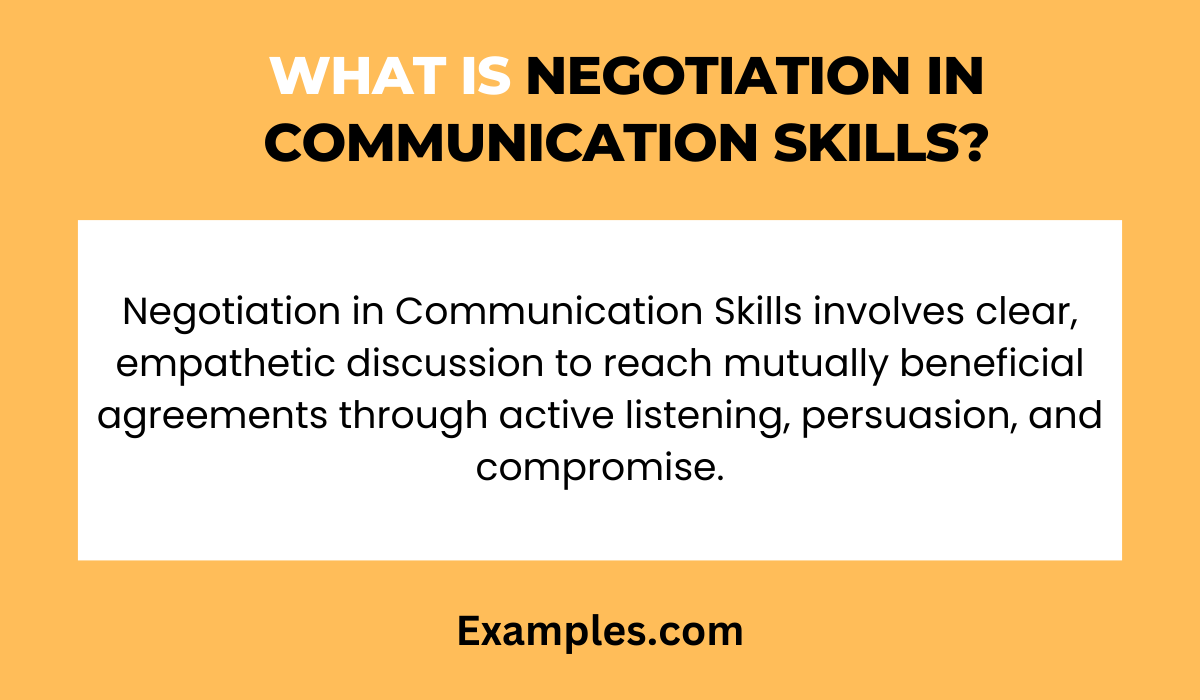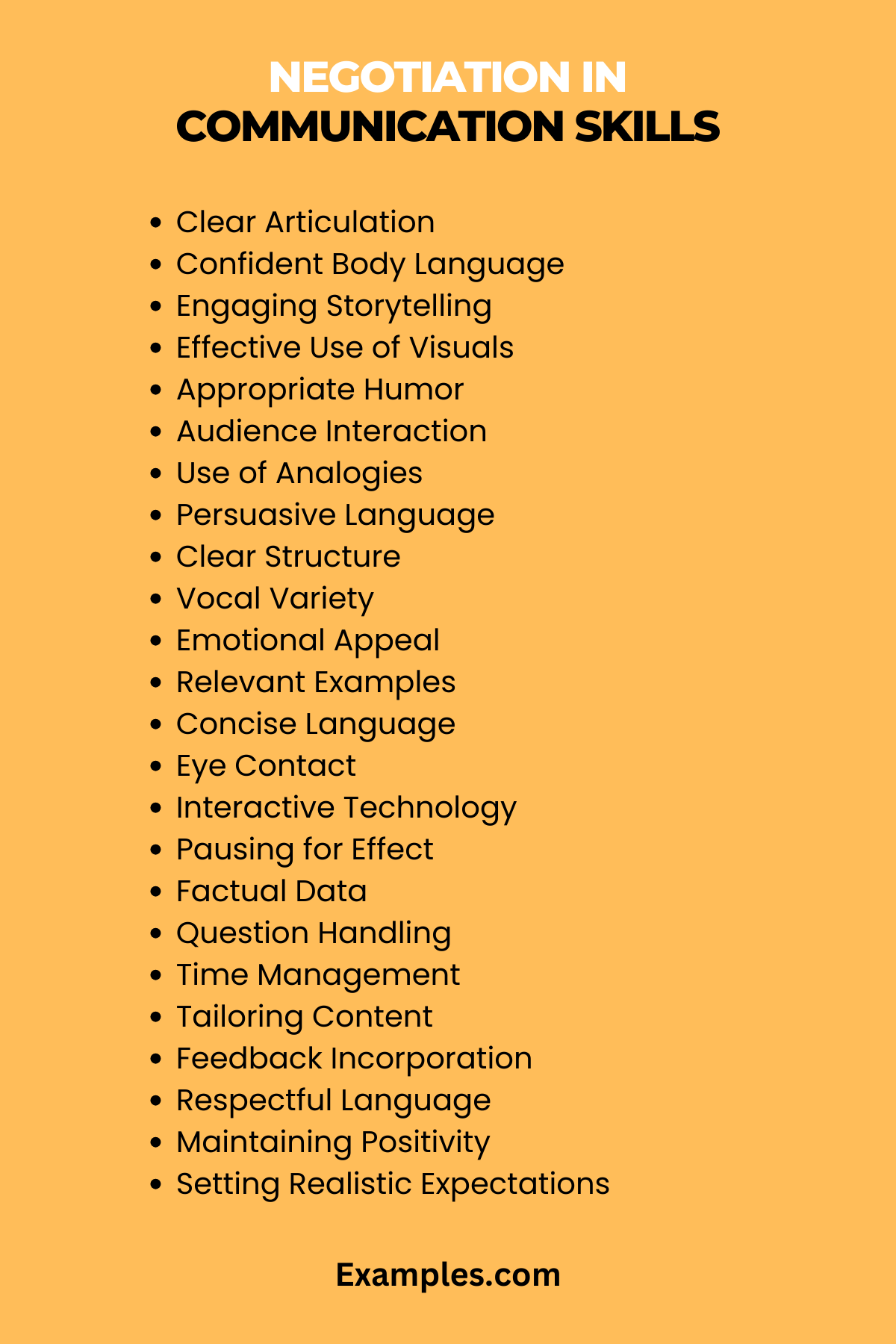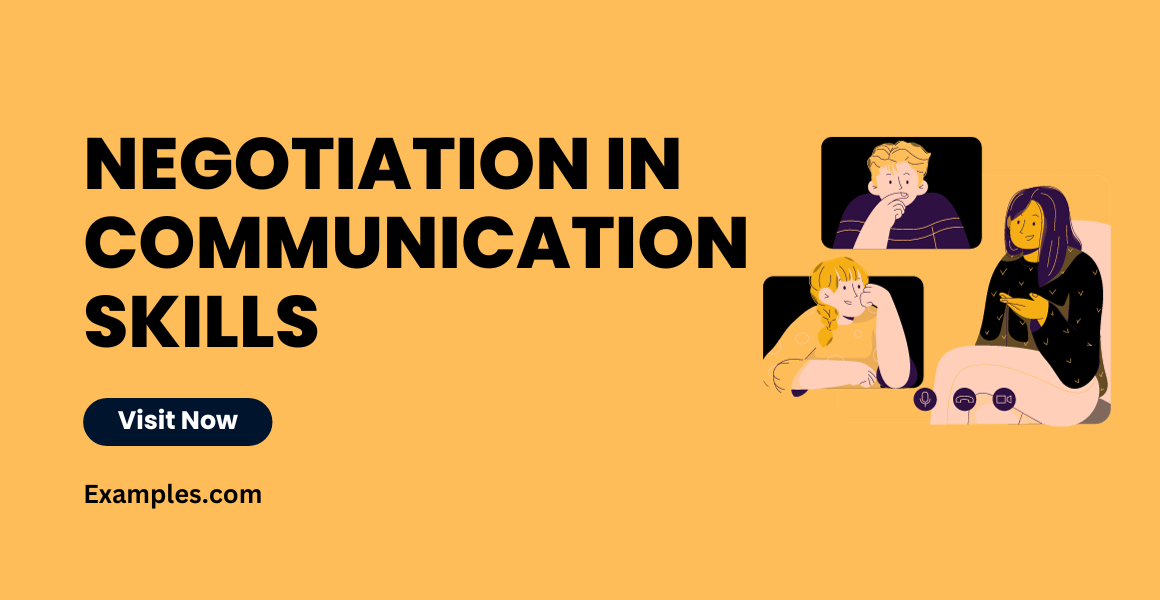29+ Negotiation in Communication Skills Examples
Navigating the nuances of Negotiation in Communication Skills is an essential skill in both professional and personal arenas. This comprehensive guide delves into the art of negotiation, offering valuable insights and strategies to enhance your abilities. With practical Communication Examples, you’ll learn how to approach negotiations with confidence, understanding, and tact. From beginners to seasoned professionals, this guide is an indispensable resource for anyone looking to improve their negotiation skills and achieve successful outcomes in various communication scenarios.
What is Negotiation in Communication Skills?
Negotiation in Communication Skills refers to the process of discussing and arriving at a mutually beneficial agreement between parties. It involves clear communication, understanding different perspectives, and skillfully balancing assertiveness and empathy. Effective negotiation requires active listening, persuasive speaking, and the ability to compromise and find common ground. This skill is fundamental in resolving differences and achieving goals in both personal and professional contexts.

What is the Best Example of Negotiation in Communication Skills?
A quintessential example of Negotiation in Communication Skills can be observed in business deal-making scenarios. For instance, during a corporate merger, negotiators from both companies employ these skills to agree on terms that benefit both parties. They use clear communication, offer persuasive arguments, listen to the other side’s concerns and needs, and ultimately reach a solution that aligns with the interests of both companies. This scenario showcases the intricate balance of assertiveness, empathy, and strategic communication essential in effective negotiation.

30 Negotiation in Communication Skills
Mastering Negotiation in Communication Skills is crucial in today’s interconnected world. This guide explores 30 key skills essential for successful negotiations. Each skill is paired with a unique example, illustrating how to effectively apply these techniques in real-world scenarios. From active listening to strategic compromise, these skills are designed to enhance your negotiation capabilities, ensuring you can navigate any discussion confidently and achieve desirable outcomes.

- Active Listening: Show genuine interest in understanding the other party’s perspective.
Example: “I hear your concerns about the budget constraints. Let’s explore a solution that works for both of us.” - Clear Articulation: Communicate your points clearly and concisely.
Example: “Our main goal is to achieve a balance between quality and cost.” - Empathy: Demonstrate understanding of the other party’s feelings and needs.
Example: “I understand how important timely delivery is for your business.” - Patience: Take time to consider all aspects before responding.
Example: “Let me take a moment to think about your proposal.” - Assertiveness: Confidently express your needs and boundaries.
Example: “While I see your point, we must also consider our company’s policies.” - Effective Questioning: Ask questions to clarify and explore deeper insights.
Example: “Can you explain how this solution benefits both our teams?” - Offering Compromises: Propose solutions that accommodate both parties’ interests.
Example: “Perhaps we can agree on a phased implementation to meet our respective needs.” - Building Rapport: Establish a connection to create a collaborative environment.
Example: “I’ve always admired your company’s approach and am excited about potential collaboration.” - Body Language Awareness: Use non-verbal cues to convey openness and agreement.
Example: Nodding during discussion, “I’m following your points, and they make sense.”

- Presenting Alternatives: Suggest multiple options to find a common ground.
Example: “If the initial proposal doesn’t work, we have a few other alternatives.” - Strategic Silence: Use silence effectively to encourage the other party to share more.
Example: Pausing after a statement to let the other party reflect and respond. - Summarizing Key Points: Recap discussions to ensure mutual understanding.
Example: “So, to summarize, we are agreeing on X, Y, and Z, correct?” - Expressing Flexibility: Show willingness to adapt your position.
Example: “I’m open to adjusting our terms if it means moving forward together.” - Focusing on Mutual Benefits: Highlight how the negotiation benefits both parties.
Example: “This partnership could really enhance both our companies’ market positions.” - Handling Objections: Address concerns in a calm and reasoned manner.
Example: “I understand your concerns about the timeline. Let’s see how we can adjust it.” - Maintaining Positivity: Keep a positive tone to foster a constructive atmosphere.
Example: “I’m confident we can find a solution that satisfies both of us.” - Respecting Different Perspectives: Acknowledge and respect differing viewpoints.
Example: “I appreciate your perspective and see where you’re coming from.” - Cultural Sensitivity: Be aware of and respect cultural differences in negotiation styles.
Example: “I understand that our business practices may differ, so let’s find common ground.” - Factual Support: Back up your arguments with data and facts.
Example: “Based on the market analysis, our proposal is competitively priced.” - Risk Assessment: Evaluate and discuss potential risks and rewards.
Example: “Let’s weigh the risks and potential benefits of this approach.”

- Confidentiality Respect: Maintain privacy and discretion when necessary.
Example: “I assure you, the details of our discussion will remain confidential.” - Creative Problem Solving: Think outside the box for innovative solutions.
Example: “What if we try a more unconventional approach to address this issue?” - Consensus Building: Work towards an agreement that satisfies all parties.
Example: “I believe we’re close to a consensus on the major points.” - Adapting Communication Style: Adjust your communication to suit the situation and audience.
Example: “I’ll explain this in a way that aligns with your team’s expertise.” - Setting Realistic Expectations: Be honest about what can be feasibly achieved.
Example: “Let’s set expectations that are realistic and achievable for both sides.” - Prioritizing Key Issues: Focus on the most important aspects of the negotiation.
Example: “Our primary concern is ensuring the quality of the product.” - Avoiding Aggressive Tactics: Steer clear of hardline or aggressive negotiation methods.
Example: “I believe we can reach an agreement without resorting to ultimatums.” - Continuous Feedback: Engage in ongoing dialogue throughout the negotiation process.
Example: “I’d like to keep the lines of communication open as we proceed.” - Balancing Emotion and Logic: Blend emotional intelligence with logical reasoning.
Example: “I understand the emotional significance of this deal, and I’ve also considered the logical aspects.” - Closing Negotiations Effectively: Aim for a clear and mutually agreeable conclusion.
Example: “Let’s finalize the terms we’ve agreed upon and move forward together.”
Importance of Negotiation Skills in Communication
The Importance of Negotiation Skills in Communication cannot be overstated. Whether in business, personal relationships, or daily interactions, negotiation skills play a crucial role in achieving desirable outcomes and maintaining healthy relationships. This guide explores the key reasons why these skills are vital.
- Facilitating Conflict Resolution: Effective negotiation skills are essential in resolving conflicts amicably.
- Achieving Mutual Benefits: Skilled negotiators can find solutions that benefit all parties involved.
- Enhancing Professional Relationships: Negotiation fosters respect and understanding in professional settings.
- Improving Decision-Making Processes: Negotiation skills lead to more informed and collaborative decision-making.
- Building Trust and Rapport: Successful negotiations build trust between parties.
- Navigating Personal Interactions: In personal relationships, negotiation helps in balancing different needs and desires.
- Aiding in Career Advancement: Proficient negotiation skills are often linked with career growth and opportunities.
- Supporting Business Transactions: In business, negotiation skills are critical for successful deals and partnerships.
- Encouraging Open Communication: Effective negotiation encourages transparent and open dialogue.
- Promoting Problem-Solving Skills: Negotiation enhances one’s ability to solve problems creatively and effectively.
How do Negotiation and Communication Skills relate?
Understanding How negotiation and communication skills relate is key to mastering the art of negotiation. These skills are intertwined, each enhancing the effectiveness of the other in various interaction scenarios.
- Foundation of Negotiation: Communication is the foundation of all negotiation processes.
- Clarity of Expression: Clear communication allows negotiators to express their needs and understand others’.
- Active Listening: Active listening in communication is vital for understanding the other party’s perspective.
- Persuasive Techniques: Effective communication includes using persuasive techniques crucial in negotiation.
- Non-Verbal Cues: Non-verbal communication plays a significant role in conveying intentions and reactions.
- Feedback Mechanism: Communication allows for feedback, which is essential in adjusting negotiation strategies.
- Building Relationships: Both skills are crucial for building and maintaining relationships.
- Conflict Resolution: Effective communication is key in resolving conflicts during negotiations.
- Cultural Understanding: Communication skills help in navigating cultural nuances in negotiation.
- Adapting to Situations: Both skills require adaptability to different contexts and situations.
What is the Role of Communication in Negotiation?
The Role of communication in negotiation is multifaceted and central to the success of any negotiation process. Effective communication is what bridges the gap between differing viewpoints and facilitates the reaching of agreements.
- Conveying Interests: Communication is used to express interests and goals in a negotiation.
- Understanding Others: It helps in understanding the needs and constraints of the other party.
- Building Trust: Open and honest communication builds trust in negotiation scenarios.
- Facilitating Compromise: Communication is key in exploring and proposing compromises.
- Resolving Misunderstandings: It plays a crucial role in clarifying misunderstandings that may arise.
- Establishing Agreements: Clear communication is necessary for establishing and finalizing agreements.
- Expressing Flexibility: It allows negotiators to show flexibility and openness to alternatives.
- Creating a Positive Atmosphere: Effective communication creates a conducive environment for negotiation.
- Maintaining Long-Term Relationships: Ongoing communication is essential for maintaining relationships post-negotiation.
- Cultural Sensitivity: In cross-cultural negotiations, communication is key to respecting and understanding cultural differences.
How to Improve Negotiation in Communication Skills
How to Improve Negotiation in Communication Skills is a journey of continuous learning and practice. This guide provides actionable steps to enhance your negotiation capabilities through improved communication.
- Practice Active Listening: Focus on listening actively to understand the other party’s perspective.
- Develop Clear Articulation: Work on articulating your thoughts and needs clearly and concisely.
- Enhance Emotional Intelligence: Emotional intelligence aids in responding appropriately during negotiations.
- Learn Persuasive Techniques: Incorporate persuasive communication strategies into your negotiation style.
- Study Body Language: Understand and use body language effectively in negotiations.
- Engage in Role-Playing: Practice negotiation scenarios to improve your skills.
- Seek Feedback: Regular feedback can help identify areas for improvement.
- Attend Negotiation Workshops: Workshops and seminars provide valuable insights and techniques.
- Read Books on Negotiation: Expand your knowledge with literature on negotiation and communication.
- Stay Calm and Patient: Patience and calmness are key in navigating complex negotiations.
Tips for Negotiation in Communication Skills
Mastering Negotiation in Communication Skills involves understanding key strategies and regularly applying them. This section offers practical tips to refine your negotiation abilities, ensuring more effective and successful interactions.
- Prepare Thoroughly: Enter negotiations well-prepared with all necessary information.
- Set Clear Objectives: Know what you want to achieve from the negotiation.
- Be Open-Minded: Be willing to consider alternative viewpoints and solutions.
- Practice Empathy: Understand and acknowledge the other party’s perspective.
- Maintain Professionalism: Always approach negotiations with a professional demeanor.
- Focus on Mutual Benefits: Aim for outcomes that benefit all parties involved.
- Manage Emotions: Keep your emotions in check to maintain clarity and focus.
- Communicate Clearly: Avoid ambiguity in your communication.
- Build Rapport: Establish a positive connection with the other party.
- Follow Up Post-Negotiation: Ensure agreements are implemented and maintain communication post-negotiation.
Mastering Negotiation in Communication Skills is essential for achieving successful outcomes in various aspects of life. This guide has provided a comprehensive overview, from the importance and interrelation of these skills to practical improvement strategies and tips. Embracing these insights and techniques will empower you to navigate negotiations with confidence, understanding, and effectiveness, leading to mutually beneficial results.



